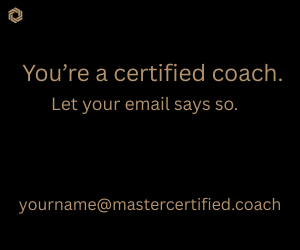All too often, new coaches dive into setting up a new practice head first but soon find themselves sinking rather than swimming! Here are three essential things that you need to do before setting up your coaching practice.
This is good old-fashioned common sense, but if you do these three things, you’ll set yourself up with strong foundations for a profitable and sustainable coaching practice.
1. Be Your Own Coach
I trained with CoachU, and a big part of their curriculum is “Personal Foundation.” There’s a reason for this: People buy people and your future clients will be buying YOU. Forgive me for stating the obvious, but you are the product. Sure, clients want the solutions we offer. But they also need to be convinced that their coach walks their talk.
So you need to work on your own “personal foundation.” Be your own coach, every single day. Do all the things you’d encourage your clients to do:
Stretch outside your comfort zone, build your resilience, be kind to yourself, focus on the present, create and assess your goals. Practice all the good stuff you will be helping your clients with.
This doesn’t mean you have to create the perfect life before you set up your practice. It’s about practicing what you preach.
You’ll be able to sell your coaching services with very little effort if you believe in what you’re selling, and the best way to believe is to be a walking advert for the benefits of coaching!
2. Keep Your Day Job—or Find a Transition Job
If you want to attract clients, then you need to put out the right energy. So if you’re desperate for your next client because you haven’t paid the rent or you’re living on credit, you’re not going to be able to serve them authentically or with integrity.
Make sure you have some way of covering your living expenses while you are in the pre or early stages of practice building. It is so much easier to attract clients when you are not desperate for them!
Back in 2003, when I was finishing my coach training, I took a part-time job that enabled me to bring in enough income to cover the bills and pay for half a day childcare for my 6-month-old son. This enabled me to spend half a day a week to work on my fledgling coaching practice. I set a “tipping point” goal: I decided that, when I earned £450 per month from coaching, I would hand in my notice and quit my part-time job to set my practice up “properly.”
While that £450 sum wasn’t enough to cover the bills, it was a figure that made me feel confident about the viability of my coaching practice. If I could earn £450 from coaching, then I could earn £900 and so on.
I always recommend some kind of sliding transition, if you can. It might be that you are working full time, so I appreciate that you might not have the option to work part time. In this case, you might need to coach clients during the evenings or weekends. Or, you quit your job for a part-time role.
Your tipping point sum is the amount of coaching income that gives you the confidence to make the leap into full-time coaching. It is personal to you, and it’s not set in stone.
3. Do Your Sums
So many of my new coach clients say they would love to become a coach, but they don’t know how to bridge the financial gap between employment and a new coaching practice. Understandably, they are concerned at the drop in income from their current salary to setting up a new business. When I ask them how much money they need each month to pay the bills and put food on the table, the most common reply is:
“I don’t know—I guess I should figure this out!”
Yes, you should!
Get those bank statements out and start looking at what you spend. Find out exactly how much money you need to make the transition from employment to coaching practice.
When you know these figures, then you can get creative with potential ways forward. Once you’ve got your figures in black and white, start coaching yourself! Ask yourself questions to test your commitment to setting up a practice and to tap into your creativity. Here are a few ideas:
- What would I be willing to cut back on?
- What do I need to save as a buffer while I’m building up my practice?
- How else could I make this transition?
- How much do I want this? Really?
- If I knew I’d have to live on 50 percent less, would I still want to be a coach?
- If I knew it was going to take me 10 years, would I still want to be a coach?
- What time scales am I looking at to make the transition to coaching?
- What are the costs associated with my current job that I might be able to eliminate when I’m working from home as a coach?
- What other ways could I build my practice without impacting my income?
Setting up a coaching practice is no different from starting any business: You have to be determined, resilient and willing to work hard. You need to know your figures, do your due diligence and be creative as you grow your business.
Take a step back, approach this positively and practically—and you’ll be swimming, not sinking, once you dive in to your brand new coaching practice!
Disclaimer
The views and opinions expressed in guest posts featured on this blog are those of the author and do not necessarily reflect the opinions and views of the International Coach Federation (ICF). The publication of a guest post on the ICF Blog does not equate to an ICF endorsement or guarantee of the products or services provided by the author.
Additionally, for the purpose of full disclosure and as a disclaimer of liability, this content was possibly generated using the assistance of an AI program. Its contents, either in whole or in part, have been reviewed and revised by a human. Nevertheless, the reader/user is responsible for verifying the information presented and should not rely upon this article or post as providing any specific professional advice or counsel. Its contents are provided “as is,” and ICF makes no representations or warranties as to its accuracy or completeness and to the fullest extent permitted by applicable law specifically disclaims any and all liability for any damages or injuries resulting from use of or reliance thereupon.
Authors
Post Type
Blog
Topic
Building a Successful Coaching Business, Business Development
Related Posts
The Executive Coaching Blueprint: Positioning, Pricing, and Performance
Transitioning from corporate to coach can feel like uncharted territory for many…
Why Coaches Need Other Coaches
Setting the Foundation When you’re learning about the field of coaching while…
Expanding Coaching Possibilities With the Coaching Spectrum Framework™
When I discovered coaching 14 years into my career as an occupational…








